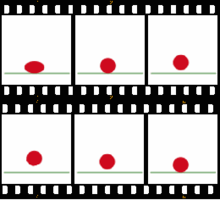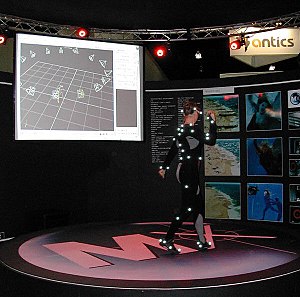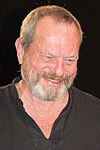Portal:Animation

| Main | Categories and topics | Tasks and projects |
Introduction
Animation is a filmmaking technique by which still images are manipulated to create moving images. In traditional animation, images are drawn or painted by hand on transparent celluloid sheets (cels) to be photographed and exhibited on film. Animation has been recognized as an artistic medium, specifically within the entertainment industry. Many animations are computer animations made with computer-generated imagery (CGI). Stop motion animation, in particular claymation, has continued to exist alongside these other forms.
Animation is contrasted with live-action film, although the two do not exist in isolation. Many moviemakers have produced films that are a hybrid of the two. As CGI increasingly approximates photographic imagery, filmmakers can easily composite 3D animations into their film rather than using practical effects for showy visual effects (VFX). (Full article...)
Selected article
"A Rugrats Chanukah" is a special episode of Nickelodeon's animated television series Rugrats. The first episode of the show's fourth season, it tells the story of the Jewish holiday Chanukah through the eyes of the Rugrats, who imagine themselves as the main characters. The idea of a Rugrats Chanukah special was pitched by Nickelodeon executives in 1992, but the concept was revised and became the 1995 special, "A Rugrats Passover". After production of the Passover episode wrapped, the crew returned to the Chanukah idea. Nickelodeon broadcast "A Rugrats Chanukah" on December 4, 1996; the episode received a Nielsen rating of 7.9 and positive reviews from television critics. Along with other Rugrats episodes featuring Grandpa Boris and his wife, the special attracted controversy when the Anti-Defamation League compared the character designs to anti-Semitic drawings from a 1930s Nazi newspaper.
Selected image
Did you know (auto-generated) -

- ... that Paul Dini was a writer for both the animated television series Batman: The Animated Series and the video game series Batman: Arkham?
- ... that, for the animated film Us Again, director and writer Zach Parrish considered a video of an elderly couple dancing to be visceral and ideal inspiration?
- ... that the Tuca & Bertie episode "The Jelly Lakes" employs a paper-cutout animation that helps to depict abuse in a way that centers the victim's story?
- ... that "Arnold's Christmas", now considered one of the most memorable episodes from the animated series Hey Arnold!, was almost rejected by network executives because it depicted the Vietnam War?
- ... that the interactive cartoon Cat Burglar takes about 15 minutes to watch, but features 90 minutes of animation?
- ... that although Blizzard's franchise Overwatch is centered around video games, its lore is mainly told through animated shorts, comics, and novels?
Selected quote
Selected biography
Terence Vance "Terry" Gilliam (born 22 November 1940) is an American-born British screenwriter, film director, animator, actor and member of the Monty Python comedy troupe. Gilliam has directed 12 feature films, including Time Bandits (1981), Brazil (1985), The Adventures of Baron Munchausen (1988), The Fisher King (1991), 12 Monkeys (1995), and The Imaginarium of Doctor Parnassus (2009). The only "Python" not born in Britain, he became a naturalised British citizen in 1968. In 2006, he formally renounced his American citizenship.
Selected list
The Simpsons' second season originally aired between October 11, 1990 and May 9, 1991, and contained 21 episodes, beginning with "Bart Gets an F". Another episode, "Blood Feud" aired during the summer after the official season finale. The show runners for the second production season were Matt Groening, James L. Brooks, and Sam Simon, who had also been EPs for the previous season. The DVD box set was released on August 6, 2002 in Region 1, July 8, 2002 in Region 2 and in September, 2002 in Region 4. The episode "Homer vs. Lisa and the 8th Commandment" won the Emmy Award for Outstanding Animated Program (For Programming less than One Hour), and was also nominated in the "Outstanding Sound Mixing for a Comedy Series or a Special" category.
More did you know...
- ...that independent filmmaker Frank Sudol wrote, animated, voiced, directed, and composed all of the music for his film Dead Fury?
- ...that cartoon producer Hal Geer successfully campaigned for Bugs Bunny to have his own star on the Hollywood Walk of Fame?
- ...that Mallory Hagan (pictured) compared the ideals of My Little Pony: Friendship Is Magic to those of the Miss America pageant while promoting its third season finale?
Anniversaries for May 23
- Films released
- 1936 - Fish Tales (United States)
- 1942 - Lights Fantastic (United States)
- 1942 - Nutty News (United States)
- 1953 - Much Ado About Nutting (United States)
- 1959 - A Mutt in a Rut (United States)
Subportals
Related portals
Wikimedia
The following Wikimedia Foundation sister projects provide more on this subject:
-
Commons
Free media repository -
Wikibooks
Free textbooks and manuals -
Wikidata
Free knowledge base -
Wikinews
Free-content news -
Wikiquote
Collection of quotations -
Wikisource
Free-content library -
Wikiversity
Free learning tools -
Wiktionary
Dictionary and thesaurus


























